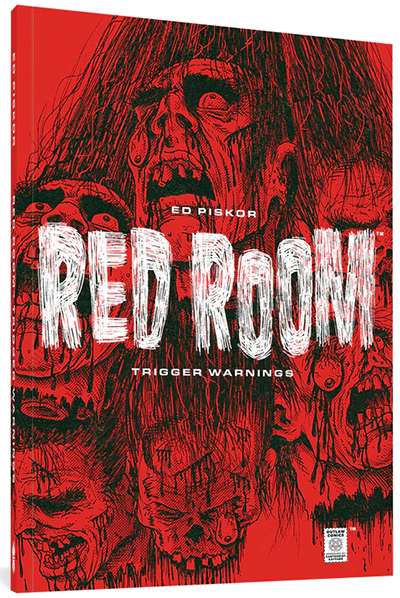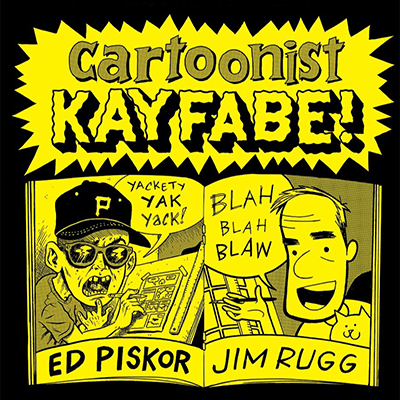Hermeneutics, Cancel Culture, and Comics
By Hervé St-Louis
March 20, 2022 - 17:24
Writer(s): Ed Piskor
Artist(s): Ed Piskor
Letterer(s): Ed Piskor
Cover Artist(s): Ed Piskor, Jimm Rugg
ISBN: 9781683965602
 |
Following the initial event, on March 18, 2022, pundits and commentators began chiming in on everything related to the story. There were criticisms about the artistic merit of the work, about the artistic merit of Rugg and Piskor as cartoonists, about Fantagraphics, and even about the comic news site The Beat which had initially displayed images of the cover in an article.
What is telling, is that the legitimacy of Cartoonist Kayfabe, the YouTube channel Rugg and Piskor have created a few years ago to analyze comic art, has been questioned. Rugg and Piskor who have at times being comic darlings because Kayfabe, have also annoyed many comics literary types of the years for their over emphasis on visual analysis to the detriment of narratives and the literary aspect of comics. The merit of their work, be it Kayfabe, their own comics, and their worth as cartoonists is questioned because of the Maus-inspired cover.
Being a researcher who has done significant work on understanding cancel culture, I sense that the first steps which occur when an individual is cancelled are at play here. Comments about Piskor being “cringe”, Rugg being “disappointing”, and both being assholes, provocateurs, racists, and bigots, abound.
Cartoonist Karl Slominski asked interesting questions about the varying level of outrage for Rugg who drew the cover, and Piskor who creates the Red Room comic. He notes, correctly that the response from commentators has been unequal with Piskor receiving more criticism than Rugg. He asks what dynamic is at play. Is Rugg not more responsible for the cover than Piskor? Slominski attributes the differential response to Piskor playing a more contrarian and rebellious role in the American comic culture than Rugg.
There are several issues at play here and I will attempt to uncover them in the rest of this essay. First, the crowd that Rugg, Piskor, and Fantagraphics upset is not the one who cares mostly for G.I. Joe Comics, X-Force, or Green Lantern. This is the comic reading crowd that shifts towards the auteur cartoonists, or what many call small press, indies, or non-mainstream. This crowd focuses on less commercial hits and sees comics as art. They also tend to be more liberal and left leaning, than conservatives, or even centrists.
For the last few years (well since 2017) this subculture in American comics has been in an open conflict with the ComicsGates crowd, the comics equivalent of GamerGate, a right wing and conservative movement which bemoans progressive cultural shifts in comics. Both groups are sensitive to any attacks and advances of contrarian visions of comics. Intolerance reigns both in the left and the right ends of comics ideology.
Think what you may of Rugg’s works, but Maus is a comic which parodies reality by representing humans as animals, such as rats, cats, rabbits, or even pigs. While this is an allegory, the work itself draws on classic cartoon tropes of retelling reality with a shift. Spiegelman’s Maus is not deferential to power structures, yet the response to the spoofing of the original comic by Rugg is seen as disrespectful. I ask myself if the critics realize that they are asking a cartoonist to be deferential to another cartoonist’s comic whose purpose is to criticize power and a historical injustice.
The whole point of cartoons, be they comics, animated films, or caricature, as I frequently argue is to criticize power and structures. Comics come from the tradition of the king’s fool. The king’s fool was the only one who was able to criticize and mock the king and anyone else, be they rich, powerful, poor, or at the mercy of others. Cartoons being in poor taste is part of what their appeal is. When deference is a value demanded of comics, they become propaganda, and cartoonists become pawns and weapons used by those in power.
What is hermeneutics?
Through Cartoonist Kayfabe, Piskor and Rugg have been involved in every step of the hermeneutic journey by focusing on obscure cartoons, to being the object of study of others who attempt to ascertain their own intentions and meaning through the work they produce as cartoonists. And the conclusion of some of these adjudicators is cancellation proposals for Piskor and Rugg.
But what are cancellation and cancel culture?
When moral norms are validated by social and legal norms, such as incest, physical violence, or obscenity, they are easy to support and enforce. However, when norms are not supported by social or legal norms, their enforcement is often outside of regulated normative structures of institutions, the law, or the state. These norms, as expressed by public opinion in social media, have a propensity to be enforced through vigilantism (call-outs, doxxing, deplatforming, cyberbullying).
Parodies, such as Rugg’s Red Room cover are allowed by copyrights laws. Anyone can legally spoof a cover from Art Spiegelman’s Maus. Anyone can parody all of Maus. Being able to spoof Maus is even an act protected by freedom of expression (or speech in the United States) in most democracies. Yet, Rugg and Piskor’s transgression for many warrants them being shun, denounced, and socially punished.
Cancellation of an individual, according to my analytic framework, can only occur if a third party who has power over an individual acquiesces to the sanctioning of the latter. Having Fantagraphics remove the variant cover from the comic is such an example. However, actual cancellation would be observed if boycotting measures against Piskor and Rugg forces Fantagraphics, distributors, and comic stores to pull Red Room or other works associated with the cartoonists. We’re not there yet, but it could happen. If the pressure were to increase, and one of these parties which has sanctioning power over Piskor and Rugg, decided to disassociate themselves from the cartoonists, they would be cancelled.
 |
To defer and stop parodies of Maus from being produced, regardless of the meaning, runs counter to freedom of expression and free speech in the United States. Rugg and Piskor’s work can be criticized but to attack the cartoonists personally is one of those slips that occurs frequently in hermeneutical approaches where the object is no longer as important as the subject who creates the work.
Some are denouncing Piskor and Rugg for quickly bowing to public opinion, and even about their silence, following their apology. Some think that the apology has not gone far enough and use that as an excuse to further criticize and attack the cartoonists. The pair is in a no-win situation, short of public self-immolation.
Remember that the work of cartoonists around the world is difficult. They are often the first ones to be killed or detained by authoritarian states.
Cartoons are not supposed to be complimentary, nice, proper, wholesome, and deferential. We tried that with the Comic Code Authority between the 1950s and 2010s and it did not work. It stifled comics for decades and transformed them into media pariahs.
Finally, I need to write this because we’re in 2022 and people don’t take time to pounder things anymore; because I am defending the freedom of expression of Piskor and Rugg, it does not mean that I am defending the merit of the work, nor that I am tolerant of all kinds of comics or parodies. I am not, but I am weary of so-called well-intended pundits, influencers, and social media-based vigilantes who would demolish cartoonists who created works that they disagreed with. I did reflect on whether to post the image of the cover in this article but decided to self-censor. I also self-censored when I covered the Prophet Mohamed cartoons in 2006. The current environment is not safe for freedom of expression.
Like you, I may have censored, or denounced some comics in the past, and like you I was probably caught in the zeitgeist, and did not reflect on what I was doing. Once you’ve done scholarly research in an area, things shift and suddenly you find that often, defending your own values, means encouraging someone you disagree with, to speak. Don’t censor comics.
References
Saint-Louis, Hervé. 2021. "Understanding Cancel Culture: Normative and unequal sanctioning." First Monday 26 (7). doi:http://dx.doi.org/10.5210/fm.v26i7.10891.
Related Articles:
Maus: A Comic Tale of Moral Panic
MetaMaus: A Look Inside a Modern Classic, Maus
